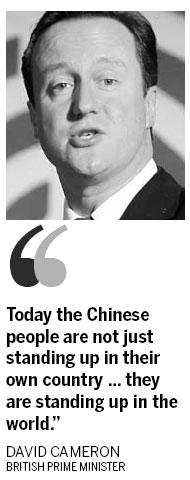
As British Prime Minister David Cameron entered a Peking University lecture hall on Wednesday to meet more than 500 students, he did so with his own fond memories of living and studying in Hong Kong more than two decades earlier.
"Twenty five years ago I came to Hong Kong as a student. The year was 1985," Cameron said.
The 44-year-old Oxford graduate and youngest prime minister in British history told the audience that "real relations" between China and the UK are founded on people to people exchanges as well as on higher levels.
The young audience was surprised that the British leader could recite the first line of lyrics of China's national anthem in Chinese. "Stand up, stand up," he said with a not-so-standard accent, and then quickly joked, "you see I still have some study to do". "Today the Chinese people are not just standing up in their own country they are standing up in the world," Cameron said.
In his 30-minute speech, Cameron reiterated that Britain sees China's rise as an "opportunity, not a threat. I say it's an opportunity. I choose engagement, not disengagement; dialogue, not stand-off; mutual benefit, not zero-sum game; partnership, not protectionism".
Cameron talked through a wide range of topics from bilateral trade to international affairs, and from China's success to its growing responsibility.
Immediately after the speech, the prime minister handpicked five students from the audience and answered their questions.
"As well as giving China suggestions, what can Britain learn from the country?" one student asked.
The prime minister said there are "many things".
"The first thing I want to learn from you is the Olympics and London is about to hold the games in 2012." Cameron also said the world should learn how China lifted 500 million people out of poverty in just 30 years. "It's clear we still have to know how you generated the growth," he said.
"I'm quite pleased with his answers in general, although I did not have the chance to raise my questions with him," said Xiao Yineng, a chemistry major student.
He said he wanted to ask Cameron to comment on the G20 summit and the Western media's reporting style. "I'm very interested in international politics, and I know that Britain will cut about $130 billion in spending. It seems the prime minister is quite practical."
Related News
Photos
More>>trade
market
- China-Saudi joint work team inspected the infrastructure projects undertaken by
- The Economic and Commercial Counselor's Office held reception with Chinese
- Spring Festival Reception held in Riyadh
- Kingdom plans agriculture investment in 27 countries
- Chinese vice premier calls for mutual beneficial development on bilateral ties
finance
- The first work team meeting for trade remedy cooperation between China and Saudi
- The Fair Trade Bureau work team of Ministry of Commerce of China visited the
- Zhejiang business delegation visits Saudi
- Prince Faisal inspects King Khalid University project
- 2010 Sino-Saudi investment barrier meeting organized by ECCO in Riyadh




